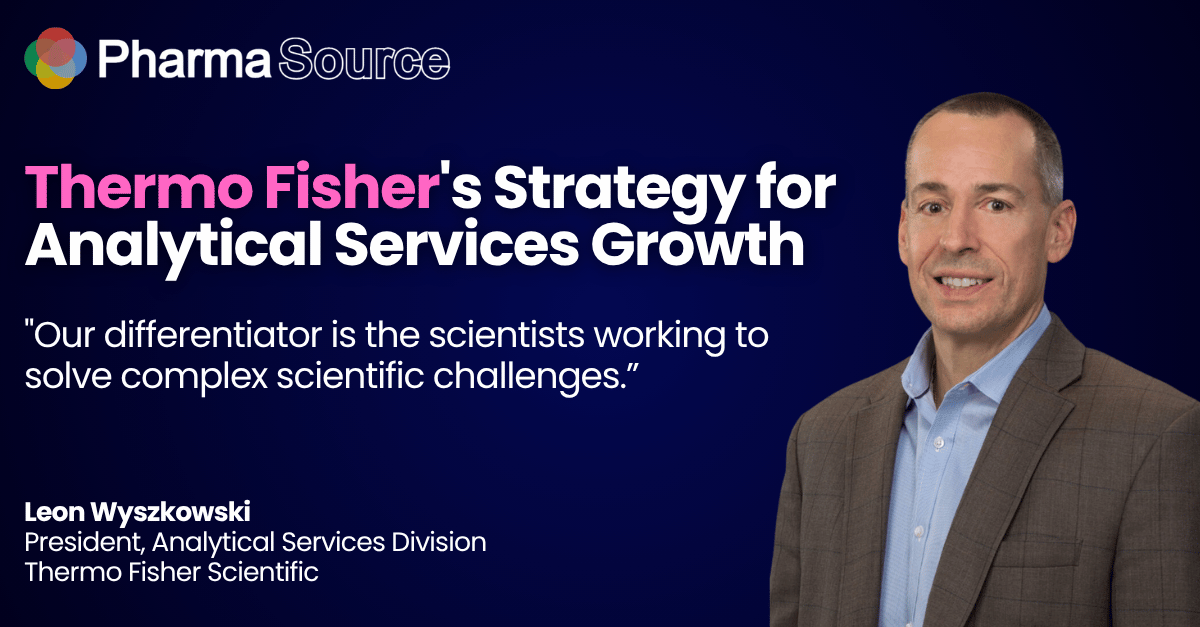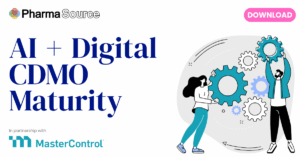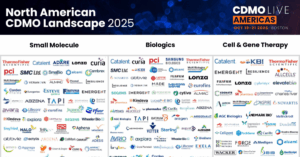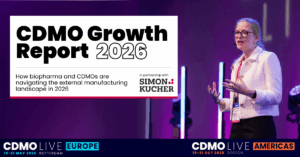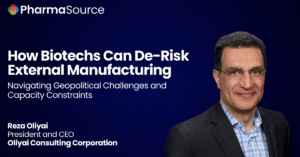“The differentiator in our business isn’t the equipment and the facility—it’s the scientists working with customers to create assays and solve complex scientific challenges.”
Leon Wyszkowski has spent nearly three decades in drug development, including 20 years at Thermo Fisher Scientific in roles spanning clinical services, CDMO operations, and now analytical services. His perspective on the evolution from internal pharma operations to service provider offers insights into how the industry’s approach to outsourcing has matured.
In this conversation, recorded at NLSDays, Leon discusses Thermo Fisher’s expansion in the Nordics, the company’s partnership with AstraZeneca’s BioVenture Hub, and why trust remains the fundamental factor when biotechs and pharma companies evaluate analytical service partners.
Understanding Both Sides
Leon’s career trajectory from Pfizer’s internal operations to Thermo Fisher’s service provider model has given him a holistic view of drug development partnerships.
“When you’re part of an innovator like Pfizer, success comes from process discipline and established platforms that have driven therapies into market,” Leon explains. “When you go external, you need agility and flexibility to support many different customers with many different approaches and processes.”
“When you’re an innovator, you tend to specialize in certain platforms. When you’re a supplier, you have to build expertise in multiple modalities and platforms, which makes you that much more of a wanted partner. Partners are looking to leverage the expertise you’re building through collaborating with other innovators.”
The relationship between sponsors and service providers has evolved significantly over Leon’s career. “When I started on the supplier side, you outsourced because you had a volume issue or a capacity issue. Nowadays, there is so much capability, know-how, and expertise on both sides that you’re truly becoming a trusted partner in these outsourcing relationships.”
Geography, Talent, and Regulation in the Nordics
Thermo Fisher is opening a bioanalytical facility in Gothenburg, Sweden, in March 2026, adding approximately 140 scientists to its global team. The investment addresses a specific gap in the company’s geographic footprint.
“We have significant capability in the U.S. and expanded about five years ago to create capability in China, but there was a gap in our footprint, specifically in Europe,” Leon says.
The decision to locate in Sweden came down to three factors. “We’re looking for a stable, transparent regulatory environment, especially when it comes to transportation. All clinical samples within Europe and sometimes globally have to come in smoothly to our laboratories for testing.”
Second was talent availability. “The differentiator in our business isn’t the equipment and the facility—it’s the scientists working with customers to create assays and solve complex scientific challenges. When you look at Sweden, there’s a very strong educational ecosystem that has created a scientific pool in the Nordics.”
The third factor was business environment. “Sweden has been known to be a very pro-business environment, which is important when you’re making an investment of this scale and you want to have a long-term partnership with the country you’re investing in.”
The AstraZeneca BioVenture Hub Partnership
Separate from the Gothenburg laboratory expansion, Thermo Fisher recently announced a research and development partnership with AstraZeneca’s BioVenture Hub.
“The BioVenture Hub partnership is really about creating these assays to address some very specific therapeutic areas that AstraZeneca and its partners are working on,” Leon explains. “It’s a collaboration for developing assays and analytical methods specifically in those therapeutic areas.”
The partnership reflects how analytical services have become more central to drug development challenges. “I had a conversation with a key partner at a big biopharma organization when I first took over this business. She was responsible for both CDMO and analytics and she said, ‘Nowadays, we understand how to manufacture these new products. The analytics is what’s giving us the biggest challenges.'”
Data Management
As analytical testing has evolved, data management has emerged as a critical constraint.
“Roughly 70% of the data submitted for regulatory approval of a therapy comes from laboratories,” Leon explains. “In the past decade, the average clinical trial has grown from generating about 900,000 data points to more than 3.2 million. That explosion in data is why data management has become so critical—and why we need to evolve how we transfer data from our laboratories to our customers.”
The industry’s conservative nature has slowed digital adoption. “We tend to be in a very conservative industry. Changes in terms of deploying AI and digital tools take time, not just for ourselves and our customers to embrace, but for the regulators to embrace. We have assays that have run the same way for 30 years that we have not changed, even though there’s better technology available, because those are the gold standard for that therapeutic area. Nobody wants to take the risk of not having the data accepted by a regulator.”
Progress requires industry-wide collaboration. “How do we continue together on this journey to educate regulators and continue to embrace technology shifts? That is happening. The technology has to be ready, and we have to be ready to accept technology to help us do our job more effectively.”
Analytical Services
Leon expects analytical services to become increasingly central as modalities grow more complex.
“The evolution of modalities—from small molecules to biologics, and now viral vectors, mRNA, antibody-drug conjugates, and radiolabeled compounds—means the more complex these become, the more impactful laboratories are going to be,” he says.
The regulatory requirements continue to expand. “Regulators still require clinical trial data for submissions, and there’s much more data required now. But getting to that data has become much more complex. The laboratory space, whether it’s testing the product or creating the clinical data required to file a submission, will continue to be important as modalities become more complex and trials become more complex.”
The Trust Factor
After 30 years across both sponsor and service provider roles, Leon identifies trust as the fundamental evaluation criterion.
“Capabilities, platforms, laboratory scale, geography, expertise—we differentiate in those spaces. But in the end, what customers are looking for when they test us out, when they visit our sites and talk to our scientists, is: Can I trust you?” Leon explains. “Whether you’re a one-molecule company or running 500 to 600 different clinical trials in a year, those molecules are the future of the company. You’re entrusting your future with a partner.”
The definition of a trusted partner has evolved. “Twenty years ago, our definition of being a trusted partner was creating a solution for whatever the customer needed you to do. Today, the definition is really understanding the challenges a customer is trying to solve and creating the best solution. Customers are rating you not just on what you’ve done before, but on what you can do for their challenges and the creative solutions you can bring.”
Trust combines objective and subjective factors. “Customers will test your scientific expertise, look at your quality metrics and on-time delivery, and assess your capabilities. There are objective measures. But in the end, it’s going to be subjective—the conversations with leadership, how you show up to a bid defense, how credible you are in recommending solutions.”
Leon Wyszkowski is President of the Analytical Services Division for Clinical Research at Thermo Fisher Scientific. He has worked in drug development for nearly 30 years with experience in operations, client services, and supply chain logistics. Prior to joining Thermo Fisher Scientific in 2005, Leon held leadership roles in operations and clinical supplies at Pfizer. He holds a bachelor’s degree in biology from Brown University.

